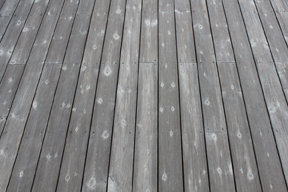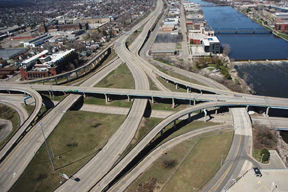
July 2020
Dear EarthTalk: I am adding a deck onto my house this summer and wonder which decking materials (wood or otherwise) are the greenest? ~ Bill A., San Francisco, CA
As the weather warms up, we gravitate toward the outdoors, and what better way to enjoy the sunshine than on your very own deck. If you are building a new deck or sprucing up an existing one, you have the opportunity to make green choices so you can relax outside guilt-free. Luckily there are plenty of attractive and low-maintenance options out there these days that won’t break the bank or ruin the planet.
Of course, most of us think wood when we think about our ideal deck. It’s non-toxic, natural, renewable and recyclable, and it biodegrades without any polluting by-products. Cedar, which is naturally rot- and insect-resistant, may be the most common decking wood, but it takes regular maintenance if it’s going to look its best and last more than a few years. Redwood is another great naturally hearty choice for decks, but it’s hard to come by—and expensive—given limited supply. Another common wood for decks is pressure-treated Yellow Pine, but the chemical impregnation that makes it stand up to the elements doesn’t look great, and, even worse, can leach copper into aquatic ecosystems.
Then there are the tropical hardwoods, controversial given the decimation of tropical forests by mechanized logging since World War II. But certification of these woods as “sustainably harvested” by non-profits like the Forest Stewardship Council (FSC) can help consumers on the hunt for deck wood feel better about their use of ipe, garapa, cumaru or tigerwood—each of which evolved in the tropical rainforests of Latin America and are known for durability and natural resistance to rot and insects. Ipe, given how attractive it looks and that it can last up to 40 years in a decking application, has become especially popular in recent years.
That said, just because your tropical hardwood is FSC-certified doesn’t mean it’s as green as something that grows closer to your home. Factoring in the length of the journey from the source forest to your home—knowing that fossil fuels will be spewed along the way—is key to determining how green your decking choice is overall.

Besides straight-ahead wood, another option is modified wood. Kebony, for instance, is an FSC-certified pine product that’s modified to last three to five times as long as other deck woods. The modification process changes the cellular structure of the wood on a molecular level, increasing its density by permanently swelling and thickening the cells. Thermory is another modified wood product that’s excellent for decking, guaranteed to last 25 years without rot.
Beyond wood, composite decking (TimberTech, Trex, Dura-Life, etc.) is gaining traction, even among some environmentalists given that it doesn’t contribute to deforestation and the resins used in its production are typically recycled. Unlike wood, these come in a variety of colors, don’t need repainting and are splinter-free. If you want to split the difference between plastic and wood, Cali-Bamboo’s composite decking made from recycled bamboo is a solid choice.
Dear EarthTalk: Do you suppose the drop in carbon emissions that resulted from transportation and industry slowdowns during the Coronavirus pandemic will continue—or will we just go right back to normal once the threat has been neutralized? ~Jane Smith, Cranston, RI
No one is happy about the havoc the Coronavirus has wreaked, but one bright side has been the reduction in carbon dioxide (CO2) emissions that occurred. Global CO2 emissions during April 2020—while the world was largely locked down—were 17 percent lower than the same time a year earlier, according to researchers from the UK’s University of Anglia. But emissions are already starting to go back up with the easing of stay-at-home restrictions.

This decrease was an unwitting occurrence and it won’t do much to stave off climate change. Dan Gearino, writing in Climate News, says: “…don’t expect this to be the silver lining of the disastrous pandemic. Climate scientists and environmental advocates say any short-term drop in emissions gives a misleading sense of progress. This could do harm if it saps some of the urgency to address climate change at a time when there are many competing demands for public money and attention.”
Indeed, the United Nations Environment Programme says that global CO2 emissions would have to fall by 7.6 percent every year this decade—slightly more than the overall reduction we’ll see in 2020—to limit overall warming to less than the 1.5 Celsius rise scientists warn could turn our world upside down.
Stay-at-home orders around the world have no doubt had a positive environmental impact in the short term as fewer cars, trucks and planes ply our roads and airways. But the longer-term outlook isn’t so good, especially when factoring in the damage done to public transit systems. Alon Levy and Eric Goldwyn of NYU’s Marron Institute of Urban Management report in CityLab that public transit ridership in major cities in the U.S., Europe and China is down 50-90 percent.
Unfortunately, attracting riders back to potentially crowded buses and trains won’t be so easy, given the germ factor. Who wants to share tight quarters with dozens of strangers on a bus or train given the transmission risks? The irony is that public transit options have been starting to proliferate as various metro areas fund light rail and other mass transit infrastructure projects to boost usage and keep drivers and their cars and trucks off the road.
While environmental advocates aren’t optimistic that we can keep up the emissions reductions achieved over the last few months, they are hopeful that the world’s reaction to the pandemic—people and governments coming together to protect human health and minimize loss of life—bodes well for our ability to handle the climate crisis as it gets more critical over the next two decades.
EarthTalk® is produced by Roddy Scheer & Doug Moss for the 501(c)3 nonprofit EarthTalk.
See more at https://emagazine.com.
To donate, visit https://earthtalk.org.
Send questions to: question@earthtalk.org

